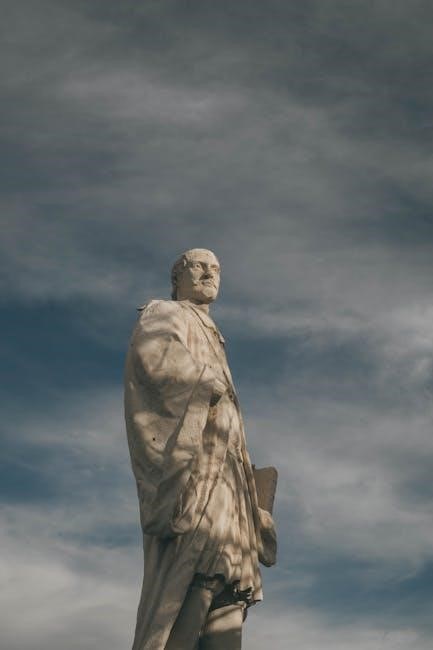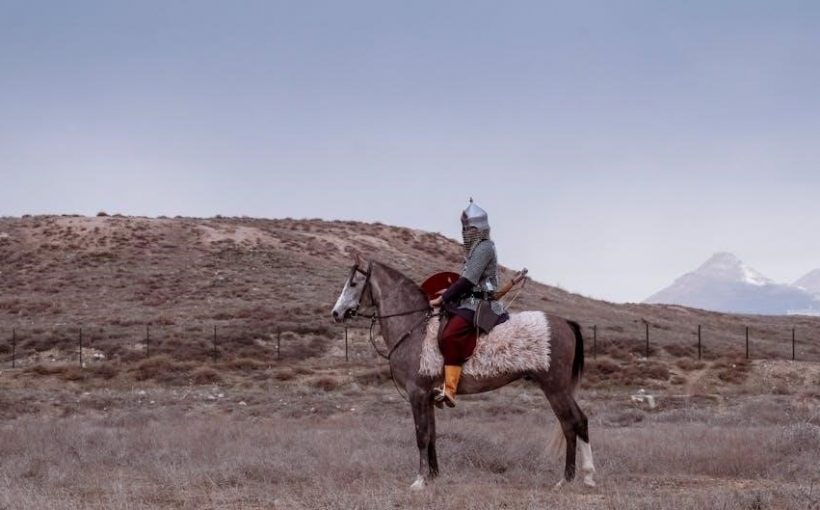The Sundiata Epic, an ancient oral tradition, narrates the legendary story of Sundiata, the founder of the Mali Empire, highlighting his heroic journey and cultural legacy․
The Significance of Sundiata in West African History

Sundiata, as the founder of the Mali Empire, holds immense historical significance in West Africa․ His epic story symbolizes the unification of diverse tribes and the rise of a powerful kingdom․ Sundiata’s leadership and triumphs, such as the Battle of Kirina, showcased his strategic brilliance and cultural influence․ His reign not only established Mali as a dominant force but also laid the foundation for a rich legacy of trade, governance, and cultural identity․ The epic highlights themes of resilience and destiny, making Sundiata a revered figure in African history․ His story, preserved by griots, continues to inspire pride and unity across generations․
The Role of Griots in Preserving the Epic
Griots, as custodians of African oral tradition, played a vital role in preserving the Sundiata Epic․ These skilled storytellers, musicians, and historians passed down the epic through generations, ensuring its survival․ By reciting, singing, and playing instruments, griots brought Sundiata’s story to life, maintaining its cultural and historical significance․ Their performances not only entertained but also educated communities about Mali’s heritage․ The epic’s preservation relied on the griots’ meticulous memory and artistic delivery, blending history with poetic expression․ This oral tradition, spanning centuries, underscores the griots’ importance in safeguarding West Africa’s rich cultural legacy, making them indispensable to the epic’s enduring relevance and accessibility․

Historical Background of the Mali Empire
The Mali Empire, founded by Sundiata in the 13th century, became a powerful West African state, renowned for its prosperity and influence under his leadership․
The Founding of the Mali Empire by Sundiata
Sundiata, a legendary figure, founded the Mali Empire in the 13th century after overcoming immense challenges․ Born to King Naré Maghan and Sogolon, a hunter’s daughter, Sundiata faced early adversity due to his physical disability and his mother’s social standing․ Despite these obstacles, he rose to power with the support of his mother and loyal allies․ Sundiata unified various West African kingdoms, creating a vast empire․ His victories, particularly the Battle of Kirina, solidified his rule and laid the foundation for Mali’s prosperity․ Sundiata’s leadership and vision transformed the region, establishing Mali as a center of trade, culture, and political influence in West Africa․

The Battle of Kirina and Its Impact
The Battle of Kirina, fought in the early 13th century, marked a pivotal moment in Sundiata’s conquests․ It was here that Sundiata defeated the powerful Sosso king, Sumanguru, ending his oppressive rule․ This victory solidified Sundiata’s authority and expanded the Mali Empire’s influence across West Africa․ Kirina’s significance lies in its role as a unifying force, bringing diverse factions under one rule and establishing Mali as a dominant power․ The battle showcased Sundiata’s strategic brilliance and cemented his legacy as a hero․ Its impact extended beyond military conquest, fostering cultural exchange and political stability, which became the cornerstone of Mali’s golden age․

Key Themes in the Sundiata Epic
Leadership, destiny, and the struggle against oppression are central themes, alongside cultural identity and unity, reflecting Sundiata’s journey and the Mali Empire’s foundation․

Leadership and Destiny
At the heart of the Sundiata Epic lies the theme of leadership and destiny․ Sundiata, destined to become a great king, embodies the ideals of strong leadership and divine purpose․ His journey from a humble, challenging childhood to the throne of Mali illustrates the fulfillment of prophecy and the will of the gods․ The epic portrays Sundiata as a unifier, guiding his people through turmoil and establishing the Mali Empire’s prosperity․ His leadership is marked by wisdom, courage, and the ability to inspire loyalty, setting a standard for future rulers․ This theme underscores the importance of understanding one’s destiny and the responsibility that comes with leadership․ The narrative serves as a timeless lesson in governance and the pursuit of greatness․
Struggle Against Oppression
The Sundiata Epic vividly portrays the struggle against oppression through Sundiata’s battles against the tyrant Sumanguru․ Sundiata, exiled and marginalized, rallies his people to resist tyranny, embodying resilience and justice․ His victory at the Battle of Kirina symbolizes liberation from oppressive rule, restoring freedom and unity to Mali․ The epic highlights themes of resistance and the triumph of righteousness over injustice, offering a universal message of hope and defiance․ Sundiata’s journey from exile to victory is a powerful testament to the enduring spirit of resistance and the fight for freedom, resonating with audiences across generations․
Cultural Identity and Unity
The Sundiata Epic is a cornerstone of West African cultural identity, celebrating the rich heritage of the Mali Empire․ Sundiata’s journey symbolizes the unity of diverse groups under one leadership, fostering a shared sense of purpose․ The epic highlights the importance of cultural traditions, such as the role of griots in preserving history and values․ Through Sundiata’s story, the epic emphasizes communal strength and the celebration of African traditions, reinforcing a collective identity․ It serves as a unifying force, bridging generations and inspiring pride in Mali’s cultural legacy․ The epic’s themes of unity and shared heritage continue to resonate, making it a vital part of African cultural consciousness․
Modern Relevance of the Sundiata Epic
The Sundiata Epic remains relevant today, inspiring educational curricula and influencing modern media, ensuring its enduring impact on cultural and historical studies globally․
Educational Use in African Studies
The Sundiata Epic is widely used in African studies to explore themes of leadership, cultural identity, and historical contexts of West Africa․ It serves as a primary source for understanding the medieval Mali Empire and its societal structures․ Educators incorporate the epic into curricula to teach history, literature, and cultural studies, highlighting its relevance in shaping African heritage․ The narrative’s themes of unity and resilience resonate with students, fostering discussions on global historical perspectives․ Additionally, the epic’s oral tradition emphasizes the importance of storytelling in preserving history, making it a valuable tool for interdisciplinary learning in classrooms worldwide․
Influence on Popular Culture
The Sundiata Epic has left a lasting impact on popular culture, inspiring numerous adaptations in literature, film, and music․ Its themes of heroism and destiny have influenced works like The Lion King, drawing parallels between Sundiata and Simba․ The epic’s rich narrative has also been adapted into stage productions and novels, further cementing its cultural relevance․ Musicians and artists draw inspiration from Sundiata’s journey, reflecting his legacy in their creations․ The story’s universal themes resonate across cultures, making it a timeless source of creative inspiration․ Its influence extends beyond academia, shaping modern media and art while preserving African heritage for global audiences․
Downloading the Sundiata Epic of Old Mali PDF

The Sundiata Epic PDF is widely available online, offered by various academic and cultural platforms for free or purchase, preserving its historical significance digitally․
Availability and Sources for the PDF
The Sundiata Epic of Old Mali PDF is readily available from various online sources, including academic platforms and cultural websites․ The most authoritative version is D․T․ Niane’s Sundiata: An Epic of Old Mali, translated by G․D․ Pickett․ It can be downloaded for free on platforms like Scribd, Academia․edu, and ResearchGate, while paid versions are accessible via Amazon and Google Books․ Additionally, many universities and libraries offer the PDF through their digital collections․ The epic has been preserved and shared by griots, ensuring its cultural and historical significance remains accessible to global audiences; This widespread availability reflects its importance as a cornerstone of West African literature and history․
Legal and Ethical Considerations for Downloading
Downloading the Sundiata Epic of Old Mali PDF requires adherence to copyright laws and ethical practices․ Many versions are available for free under public domain or open-access licenses, particularly those retold by griots․ However, copyrighted translations, like D․T․ Niane’s version, must be accessed legally through purchases or authorized platforms․ Users should avoid pirated copies and respect intellectual property rights․ Supporting authors and publishers by purchasing legitimate copies ensures fair compensation and preserves cultural heritage․ Always verify the source and licensing terms before downloading to maintain ethical standards and comply with legal requirements․ This ensures the epic remains accessible while honoring its creators and cultural significance․
